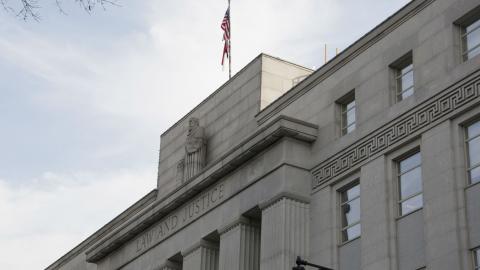Supreme Court of North Carolina Set to Hear Cases Next Week with New and Re-elected Justices
Article contents

This afternoon concludes a week of investiture ceremonies of new and re-elected justices to the Supreme Court of North Carolina. Ceremonies were for a new chief justice and three associate justices, which make up more than half of the court's panel of seven justices.
On Monday, January 5, Chief Justice Mark D. Martin took the oath of office to become the state's 28th Chief Justice. In addition to holding the highest judicial office in North Carolina, Chief Justice Martin will lead the state's Judicial Branch of government.
In the days following his ceremony, Associate Justices Robin Hudson and Cheri Beasley and Court of Appeals Judge Sam Ervin IV were formally invested - Justice Hudson on January 6; Judge Ervin on January 7; and Justice Beasley today.
After this week's special sitting for investitures, the new court will convene immediately next week to hear its first cases.
"I am committed to calendaring more appeals for full briefing and argument at the Supreme Court," Chief Justice Martin said. "I also will be working on the needs of the Supreme Court to enable justices to consider more appeals, issue more written opinions, and provide appropriate guidance to legal system stakeholders and the public at large."
As part of his investiture remarks, Chief Justice Martin spoke about his ongoing work to support his administration of justice plan and about the legislative session for the upcoming biennium, which is scheduled to start next week. The linchpin for his work is to raise the Judicial Branch's visibility as a separate and co-equal branch of government. He also talked about the dire need to fund the state's courts, after facing $80.6 million in budget cuts during the recession.
The Supreme Court of North Carolina, which sits in Raleigh, is the state's highest court, the state has no further appeal from this court's decisions. The Supreme Court has no jury, and it makes no determination of fact; rather, it considers error in legal procedures or in judicial interpretation of the law. On average, the court processes more than 600 cases per state fiscal year.
About
Photos and other biographical information available.
Chief Justice Martin is the 28th Chief Justice of the Supreme Court of North Carolina and has served in this position since being appointed by Governor Pat McCrory to fill the vacancy created when former Chief Justice Sarah Parker retired. He was elected Chief Justice in November for an eight-year term effective January 1, 2015. He has served the Supreme Court since being elected in 1998. He has authored more than 400 appellate decisions during his 20-year tenure on the Supreme Court and Court of Appeals. He is the only sitting judge in North Carolina who has served on the Supreme Court, Court of Appeals and Superior Court. He has served on the adjunct legal faculty at Duke University, North Carolina Central University, and the University of North Carolina, and recently concluded a term as the Judicial Division Chair for the American Bar Association. He earned his juris doctor degree (J.D.) from the University of North Carolina School of Law after receiving his undergraduate degree from Western Carolina University. He also has a Master of Laws (LL.M.) Degree in Judicial Process from the University of Virginia. Read more.
Justice Robin Hudson has served on the Supreme Court of North Carolina since 2007. She was reelected in November to her second eight-year term effective January 1, 2015. She served on the Court of Appeals from 2001 to 2006, and was the first North Carolina woman elected to the appellate court division without having been appointed first. Read more.
Justice Sam Ervin IV has served on the Court of Appeals since 2009. He was elected to the Supreme Court in November to an eight-year term effective January 1, 2015. He served on the North Carolina Utilities Commission from 1999 to 2009 after being initially appointed by former Governor James Hunt Jr. Read more.
Justice Cheri Beasley has served on the Supreme Court of North Carolina since her appointment in 2012. She is the second African-American female to serve on the Supreme Court. She was reelected in November to an eight-year term effective January 1, 2015. She served on the Court of Appeals from 2009 to 2012, was a district court judge in Cumberland County from 1999 to 2008, and an assistant public defender for five years. Read more.